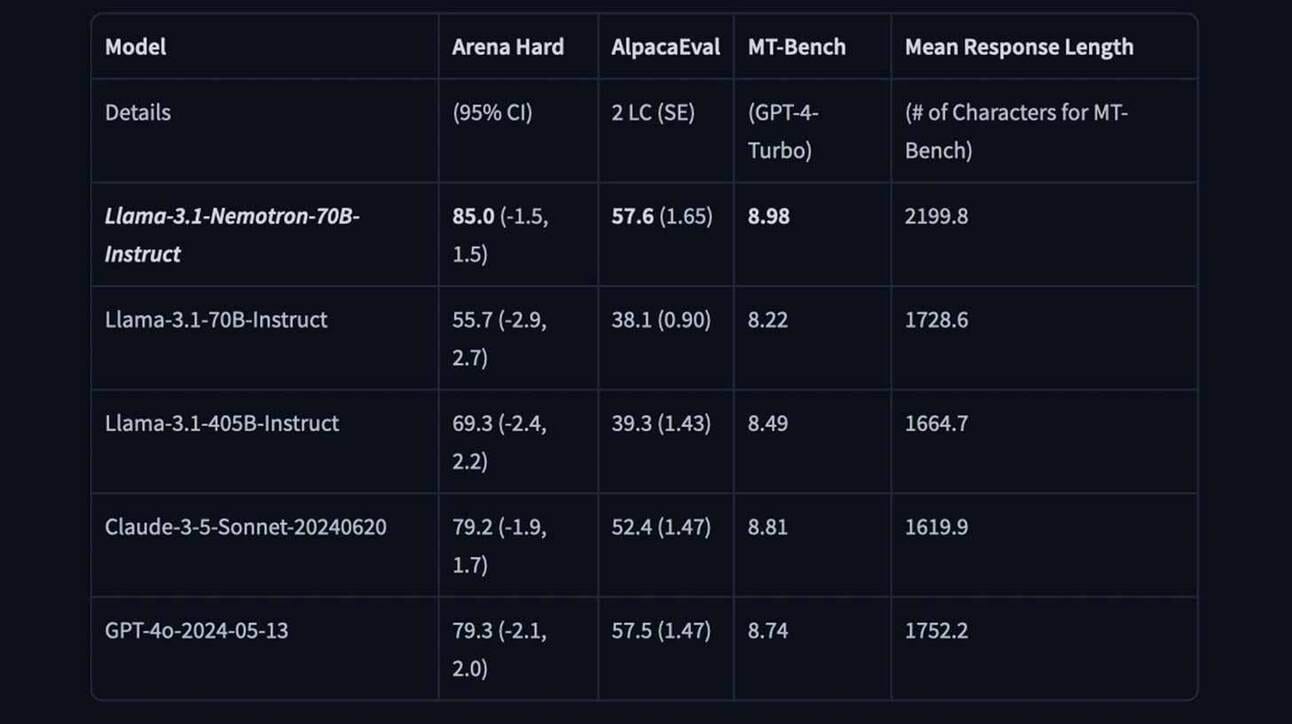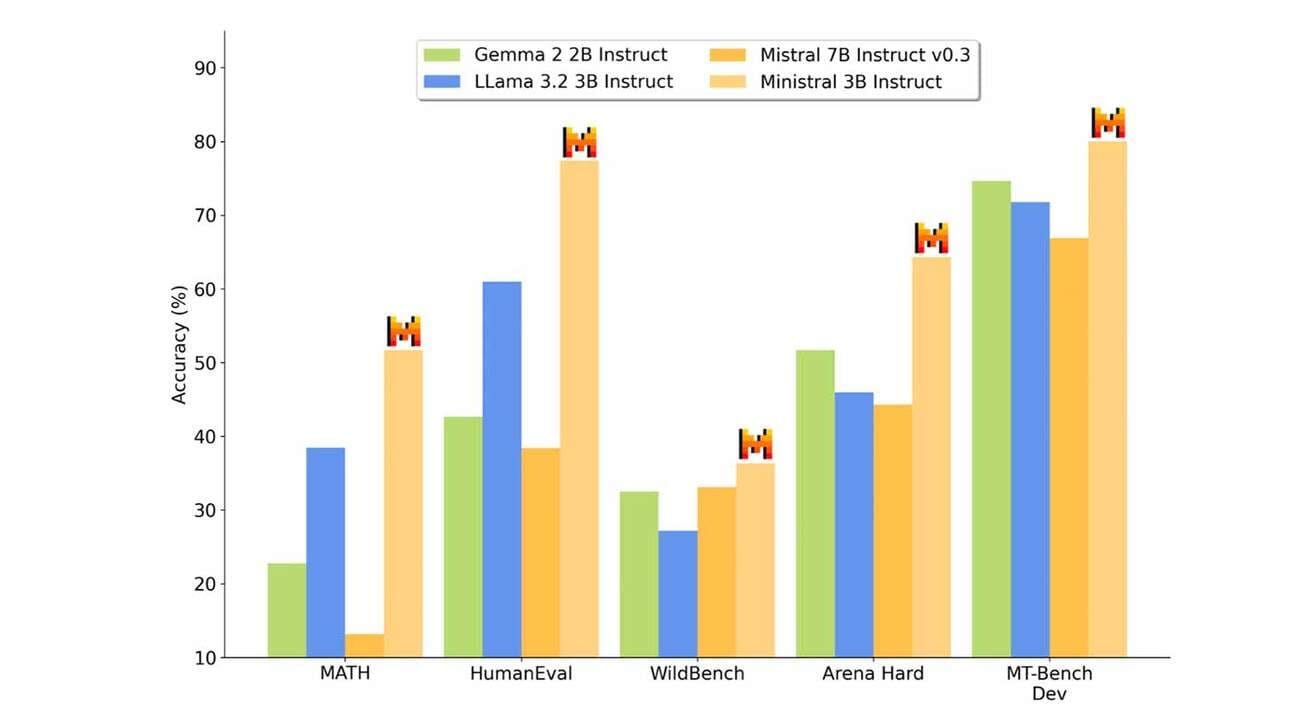Sign Up | Advertise | Podcast | AI University
Welcome, AI enthusiasts.
Nvidia is already crushing the chipmaking game, but its models are also casually topping the LLM benchmarks and outperforming the giants.
Did the company’s latest Nemotron release just give the open-source AI movement a new champion? Let’s get into it…
In today’s AI rundown:
Nvidia’s Nemotron outperforms leading AI models
Mistral AI unveils powerful new AI models for devices
Superstudio is your all-in-one creative AI platform
Boston Dynamics, Toyota team up on AI humanoids
5 new AI tools & 4 new AI jobs
More AI & tech news
Read time: 4 minutes
LATEST DEVELOPMENTS
NVIDIA

Image source: Nvidia
The Rundown: Nvidia quietly released a new open-sourced, fine-tuned LLM called Llama-3.1-Nemotron-70B-Instruct, which is outperforming industry leaders like GPT-4o and Claude 3.5 Sonnet on key benchmarks.
The details:
Nemotron is based on Meta’s Llama 3.1 70B model, fine-tuned by NVIDIA using advanced ML methods like RLHF.
The model achieves top scores on alignment benchmarks like Arena Hard (85.0), AlpacaEval 2 LC (57.6), and GPT-4-Turbo MT-Bench (8.98).
The scores edge out competitors like GPT-4o and Claude 3.5 Sonnet across multiple metrics — despite being significantly smaller at just 70B parameters.
NVIDIA open-sourced the model, reward model, and training dataset on Hugging Face, which can also be tested in a preview on the company’s website.
Why it matters: Is a smaller open-source model racing to the top? While NVIDIA’s chipmaking triumphs are well-known, more surprising are the powerhouse models the company continues to produce. With open-source foundations and advanced fine-tuning, Nemotron is showing that smaller, efficient models can compete with giants.
TOGETHER WITH WEBAI
The Rundown: webAI offers a unique platform for local, customizable, and fully-owned AI models, empowering businesses to harness AI’s potential without compromising on security and flexibility.
With webAI, you can:
Develop and test AI solutions in-house, eliminating the need for external AI teams
Utilize local compute, allowing you to prototype fast and securely at lower costs
Seamlessly deploy across various environments, from local to cloud and edge
Try webAI today and start building seamless local AI.
MISTRAL AI

Image source: Mistral AI
The Rundown: French AI startup Mistral AI just launched two new compact language models designed to bring powerful AI capabilities to edge devices like phones and laptops.
The details:
The new ‘Les Ministraux’ family includes Ministral 3B and Ministral 8B models, which have just 3B and 8B parameters, respectively.
Despite their small size, the models outperform competitors like Gemma and Llama on benchmarks, including Mistral's 7B model from last year.
Minstral 8B uses a new ‘interleaved sliding-window attention’ mechanism to efficiently process long sequences.
The models are designed for on-device use cases like local translation, offline assistants, and autonomous robotics.
Why it matters: While we await the incoming rollout of Apple Intelligence as many users’ first on-device AI experience, smaller models that can run efficiently and locally on phones and computers continue to level up. Having a top-tier LLM in the palm of your hand is about to become a norm, not a luxury.
AI TRAINING
The Rundown: Kaiber announced Superstudio, a brand new AI-powered infinite canvas, launching with Flux and Luma to help bring your creative ideas to life.
Step-by-step:
Visit www.Superstudio.app and sign up for a free account
Click the “+” in the top Navigation Bar to add a Flow to your Canvas
Create an image with the Flux Flow or Image Lab Flow
Create a video using the Luma Flow to bring your images to life
PRESENTED BY SONAR
The Rundown: Sonar provides comprehensive solutions to validate and improve AI-generated code, helping produce reliable and secure software you can trust.
With Sonar, you can:
Validate AI-generated code with AI Code Assurance
Generate code fix suggestions in a single click with AI CodeFix
Mitigate risks inherent in AI-generated code
BOSTON DYNAMICS

Image source: Boston Dynamics
The Rundown: Boston Dynamics and the Toyota Research Institute just announced a new partnership to accelerate development of advanced humanoids, with plans to integrate TRI’s Large Behavior Models (LBMs) into the Atlas electric robot.
The details:
Toyota’s LBMs aim to teach robots to handle multi-task, dexterous vision, and language-guided capabilities.
The partnership combines two robotics labs owned by competing automakers, Hyundai (who purchased Boston Dynamics in 2020) and Toyota.
TRI‘s ‘Diffusion Policy’ enables robots to learn 60+ complex skills from human demos without coding, a key component of the partnership’s research efforts.
Boston Dynamics retired its hydraulic Atlas robot in April and debuted the electric update, currently being tested in Hyundai’s automotive factories.
Why it matters: The race for commercial humanoids is heating up fast — and this partnership represents a major power move. But with the likes of Tesla’s Optimus, Figure’s 01 humanoids, and others in the mix, there is no shortage of rivals rushing to capture the massive potential of the emerging general-purpose robots.
NEW TOOLS & JOBS
🧠 Focus Buddy - An AI productivity co-pilot to help you get more done
🔎 Dropbox Dash for Business - Find, secure, organize, and share from your company’s apps, files, and tabs
🗣️ Subtitly - Realtime subtitles and translations for any app
✍️ Wandpen - Distraction-free AI rewriter for Chrome that works where you write
🙋♂️ FAQWidget - AI-powered FAQ generator for boosting engagement and sales
🛡️ Weights & Biases - Senior Product Manager, Identity & Governance
🧠 Meta - Research Scientist Intern, Gen AI Large Language Models
🚦 Waymo - Field Safety Lead
🌟 OpenAI - Residency 2025
QUICK HITS
Free event: The Executive Guide to Building AI Apps. Is your company ready to integrate AI into its internal and external products? Find out. RSVP here.*
ChatGPT's web traffic reached a record 3.1B visits in September 2024, according to Similarweb, representing a 112% year-over-year increase and making it the 11th most visited website globally.
Suno launched Suno Scenes, allowing users to generate songs using images or videos instead of just text prompts.
Google Public Sector announced $15M grants to upskill U.S. government workers in responsible AI with plans to train over 100,000 public sector employees across federal, state, and local levels.
OpenAI published research examining how ChatGPT responds to usernames with various genders, racial, and cultural backgrounds — finding minimal bias but some stereotypical responses in open-ended tasks like creative writing.
Fashion brand Lacoste is leveraging AI for anti-counterfeit technology, using a tool called Vrai AI to analyze tiny logo details that can uncover fakes at 99.7% accuracy.
Palantir CISO Dane Stuckey announced that he is joining OpenAI as the company’s new chief information security officer, helping to drive the ‘development of safe AGI for the world.’
*Sponsored listing
THAT’S A WRAP
That's it for today!
See you soon,






